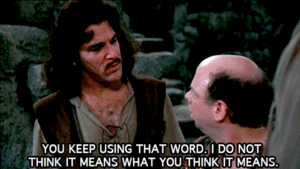Where have I heard that before? It became popular on a book cover and then used widely on a campaign trail not so long ago. It’s a catchy little phrase and when used in the context our political class prefers, it simply means, “We all take part in shaping youth.” There are many other similar ways you could rephrase it, but it is meant to convey to anyone hearing it that there is a responsibility and interest for 3rd parties to influence your children.
Yeah, I said that right. Because that’s what they mean when they say it. Sure, you and I may not actually understand it quite like that, but that’s the intent when you hear it from ANY politician regardless of the big D or R behind their name. How do I know you ask? Because if they really believed you, your church family, your community, and your circles were capable of the task the proverb infers, then they’d leave you alone to do it. Yet when they remind you of it, what typically follows is the justification for an additional law, rule, regulation, mandate, or action they’re about to take. Consider this, when you hear that phrase uttered, you should be checking your 6…
Remember throughout “The Princess Bride” when Vizzini keeps using the word “Inconceivable!” and Inigo finally says to him, “You keep using that word. I do not think it means what you think it means…”

I’m a bit snarky on this one if you can’t tell. Words have meaning and when we hear them and they sound like they fit, we use them in kind. Too often, they’re wrong. Some are darned subtle, some aren’t. Yet words that are well expressed seem to be leaving our culture at a rapid pace. We’re quite busy regurgitating the ‘narrative’ we hear in the news, from the political class and even our friends, that we don’t give it a second thought. We allow others to co-opt the meaning of words and redefine their meanings without even noticing. When this happens, we cease true understanding of the words, and by virtue of misuse, someone else then redefines the nature of the conversation without us really knowing it.
“At what point did you stop beating your wife?”
Imagine somebody sits you down for a TV interview and the first question out of their mouth is, “At what point did you stop beating your wife?” That’s ugly, isn’t it? When a false premise is imported into any question or conversation, any response that acknowledges it is thereby flawed as a result. We all have an innate desire to please deep within us. Do we not? There are some of us who have managed to overcome the built-in desire of consent, but by far and large we seek to respond in kind in almost all conversations. Knowing that, how do you answer the question above? There is no way you can answer that question. None.
Let me help bring this around for you. When people say, “It takes a village to raise a child,” they really mean there are lots of influences and we all need to take part. I’m guessing when your neighbor says this, his intent is similar to what I wrote. But that isn’t quite what that Nigerian proverb meant in the traditional sense. If you take in the Igbo and Yoruba context, it boils down to child-rearing being a communal effort. Sound the same as what I wrote? Kind of…
But in Africa at the time this proverb came to be known by the Western world, there was no government looking over their shoulders. There were no lawmakers. There were no police. There was no Department of Child and Family Services. No schools, no emergency rooms, no bicycle helmets, and certainly no Twitter existed then. So in proper context what they’re saying is their small communal group, or tribe if you will, all participated on some level. The expectations were present for Mom and Dad to do the work, but others pitched in. Similar proverbs from similar regions are witnesses to this. The Sukuma (Tanzania) proverb, “One knee does not raise a child” and the Swahili (Central and Eastern Africa areas) proverb, “One hand does not nurse a child” flesh this out some.
Children are a blessing from God. Yet, the responsibility for raising up children was still primarily within the posterity line. It is customary in African cultures, where the proverb originated for Grandparents, Aunts, Uncles, etc. to work in tandem with parents to build up the children and pitch in. “Village” in this sense of the word is really, family. It was certainly never intended for the ‘state’ to participate in any fashion. There was no ‘state’ at the time this proverb was uttered for the first time. And, not surprisingly, “Village” in the ancient African sense was often a family community with one large structure or a series of smaller structures forming a logistical neighborhood.
So when some guy rolls up and drops their version of a truth bomb on you with, “It takes a village to raise a child,” what they really mean is, “I am authorized to be in your business and hold a qualifying opinion over the instruction of your children.” Sorry guys. I’m not trying to step on your toes, but… Any guy rattling that little ditty off might not even know the true nature of what he’s actually saying, but that’s what that means. The African proverbial idea that “Families work in harmony to best nurture a child,” isn’t what they mean even though that’s the true origin of the phrase.
Who do you want to raise your child? It should be you by the way… LOL. But the supplement to you and yours should be whom? My sincere hope is you have a Christ-centered family and church family to give you aid and provide biblical consistency for all your benefit. If not, I believe it’ll be rationally tougher for you to accomplish some of the tasks. Free of a family support network, child rearing is arguably tougher.
Deuteronomy 6:4-9 – “Hear, O Israel! The Lord is our God, the Lord is one! You shall love the Lord your God with all your heart and with all your soul and with all your might. These words, which I am commanding you today, shall be on your heart. You shall teach them diligently to your sons and shall talk of them when you sit in your house and when you walk by the way and when you lie down and when you rise up. You shall bind them as a sign on your hand and they shall be as frontals on your forehead. You shall write them on the doorposts of your house and on your gates.
Be salt my brother and sisters in Christ. Seek much light. To seek light, in this case, is to learn what a phrase really means, and instruct your children accordingly in a biblical fashion.


